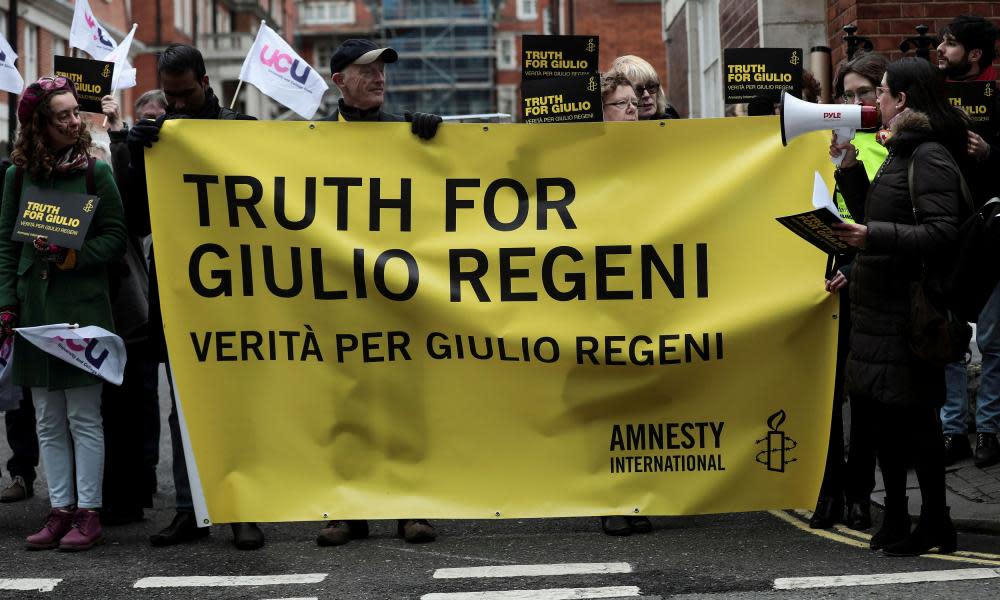Giulio Regeni: trial of Egyptian security agents charged over death begins in Rome

A court in Rome has begun the trial of four Egyptian security service officers accused of killing an Italian researcher, Giulio Regeni, five and a half years after his mutilated body was found in a ditch by a road in Cairo.
Italian prosecutors accuse Gen Tariq Saber, Col Aser Ibrahim, Capt Hesham Helmi, and Maj Magdi Abd al-Sharif of the “aggravated kidnapping” of Regeni, while Sharif is also charged with “conspiracy to commit aggravated murder”. Kidnap carries a potential sentence of up to eight years in Italy, while Sharif could receive a life sentence.
However, the four accused men are standing trial in absentia, after Egypt refused to acknowledge the trial in Rome and closed its own investigation into the incident late last year, claiming “the perpetrator of the student’s murder remains unknown”. Egypt has reportedly stonewalled efforts to investigate the incident, which included providing vital evidence to the Italian side with unexplained “gaps”, rendering it useless.
Officials from Egypt’s judiciary and interior ministry have also refused to supply the addresses of the four men, blocking Italian efforts to officially inform them that they are on trial. Court-appointed defence lawyers for the Egyptian side previously argued that the trial should not continue if the four accused were unaware that they were being tried. A judge in Rome ruled in May that news of the proceedings will have reached them and allowed the case to continue.
The men are agents of Egypt’s powerful National Security Agency (NSA), which prosecutors said trapped Regeni “in a spider’s web” of surveillance in the months before his death while he researched trade unions in Cairo, a topic the Egyptian government views as politically sensitive. Italian prosecutors will outline how Regeni was arrested in January 2016 and taken to a police station in central Cairo before being transferred to a facility run by the NSA, where he was tortured.
Regeni’s parents were amongst the first to arrive at the trial, which is being held in a high-security Rome prison.
The Regeni case lays bare the depths of the Egyptian state’s surveillance of everyday life It also provides unusual insight into the inner workings of the NSA, a body that specialises in surveillance and policing of political and terrorism cases, whose methods often focus heavily on repression of political and civil society activity.
As a result, the trial also represents an extremely rare opportunity to hold Egyptian security forces accountable for abuses that observers say have become routine, particularly enforced disappearances where detainees are held in secret, a practice heavily associated with torture.
The Egyptian Commission for Rights and Freedoms, a Cairo-based human rights organisation whose lawyers represent the Regeni family in Egypt, said in a report that it tracked 2,723 cases of enforced disappearances between 2015 and last year, but Regeni’s case represented one of the earliest examples where a detainee was forcibly disappeared, tortured and murdered.
Since the Egyptian president, Abdel Fatah al-Sisi, swept to power in a military coup in 2013, prosecutions of even junior police officers for crimes committed against civilians are extremely rare, while trials or any form of internal accountability for members of Egypt’s security forces are unheard of.
Efforts to bring representatives of the Egyptian state to justice outside the country have also faltered. A court in Washington last month threw out a case against the former Egyptian prime minister Hazem el-Beblawi over his involvement in the torture of a previously imprisoned Egyptian-American citizen.
Shortly after Italian prosecutors named the four men as suspects, their Egyptian counterparts said that the indictments of members of their security forces were “ not based on consistent evidence”. Yet they added that any accusations against security officials were based on “individual acts by them, with no connection to any official institutions in Egypt”.
The Egyptian foreign affairs ministry did not respond to a request for comment regarding the trial in Rome, and calls to the Egyptian embassy in the Italian capital went unanswered.
Related: Egypt accused of widespread state-sanctioned killings of dissidents
The question of whether there was high-level support behind the kidnapping and killing of Regeni is likely to cast a shadow over proceedings intended to determine the truth about what happened to Regeni. Prosecutors in Rome have also sought information on the involvement of 13 other security agents, but said “the Egyptian authorities’ lack of response to our requests has impeded our inquiry”.
The Egyptian side has not publicly acknowledged the trial in Rome. However, Sisi recently unveiled a strategy intended to “upgrade human rights” in Egypt, one that makes little mention of the security forces’ role in repressing civil society activity. The Biden administration recently withheld on grounds of human rights a small part of the $1.3bn (£950m) in military aid that Egypt receives annually.
“This is a brutal regime, why are they issuing a human rights strategy?” said Amy Hawthorne, an expert on Egypt at the Project on Middle East Democracy in Washington. “The primary audience for this is international.”
Hawthorne said the trial in Rome represented a rare moment of accountability for the Egyptian security forces, due to the involvement of a foreign national. “That’s far more than Egyptian victims ever get in Sisi’s Egypt,” she said. “There is no justice in Egypt.”

 Yahoo News
Yahoo News 
